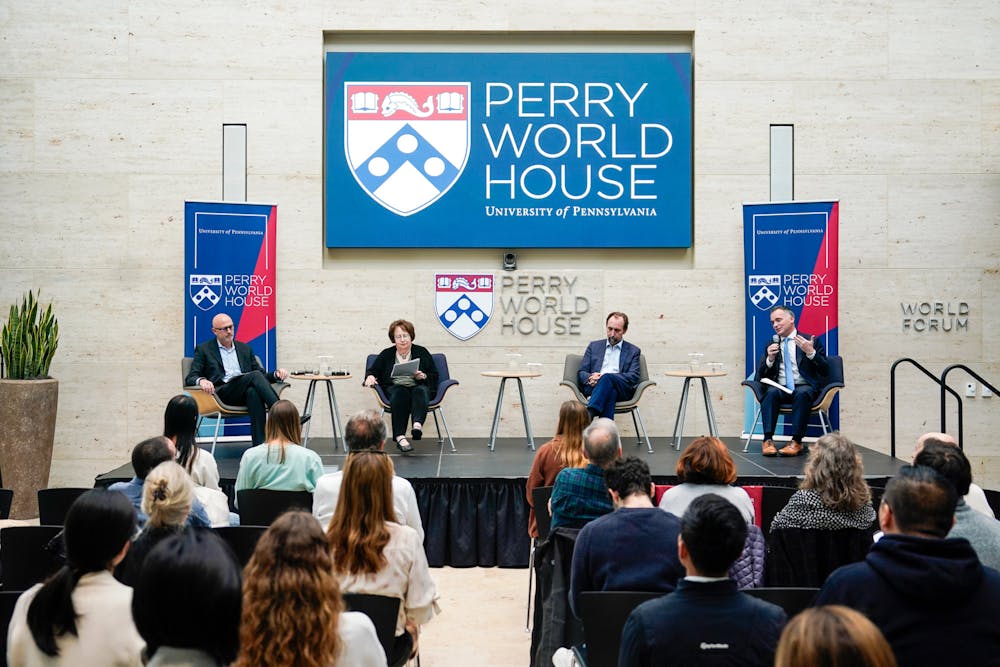
Perry World House hosted "Israel and Hamas at War," a panel event for the Penn community to learn about the historical and political context of the ongoing violence between Israel and Hamas.
Credit: Anna VazhaeparambilPerry World House hosted a discussion about the historical and political context of the ongoing violence between Israel and Hamas.
The event, called “Israel and Hamas at War,” took place at 12 p.m. at Perry World House and brought together three experts on the region. According to Perry World House, 150 people attended the event in person, and approximately another 400 attended on Zoom.
Interim Perry World House Director Michael Weisberg moderated the discussion, which included professor of Political Science Guy Grossman, former United Nations High Commissioner for Human Rights and Perry World House Professor of the Practice of Law and Human Rights Zeid Ra'ad Al Hussein, and Perry World House Visiting Fellow and Worldview columnist for The Philadelphia Inquirer Trudy Rubin.
“In times like this, one of the roles that universities play is to try to help make sense of a world that can seem really upside down,” Weisberg said in his introduction to the discussion.
According to the event’s registration page, the speakers addressed questions such as “What led to Hamas's attack? How has and will the international community respond? And what might we expect to see moving forward, drawing on historical precedence?”
Throughout the event, speakers detailed the historical context of the violence and provided listeners with an overview of the past peace talks and negotiations in the region. The experts also discussed predictions for what might happen next in the region.
Weisberg began by asking the speakers whether the Oct. 7 attack by Hamas could be considered Israel’s 9/11.
“One thing that they have in common is the shock of it all,” Rubin said, and pointed out the “personal nature” that both events share. “Almost every Jewish person does know someone who was killed, injured or wounded,” she said.
Zeid delved deeper into the possible consequences of Hamas’s attack on the region, saying “Arabs fully realize that those who are going to pay the price will be the civilians of Gaza.”
Grossman said that when past traumatic events are compared, it comes at the expense of some clarity.
“Obviously, there's parallels between 9/11 and October 7, but I think these two events need to be considered in their own terms.”
Weisberg asked the speakers to explain the history of peace efforts in the region, and why they have failed since the 1993 Oslo Peace Accords.
“History will record the best of intentions and true commitments by the negotiators in 1993 who were done in by radicals on the Palestinian side and the radicals on the Israeli side, who never thought two states could emerge,” Rubin said.
When asked why Hamas chose now to attack, Grossman explained the geopolitical situation of the region and the complexities of determining responsibility.
“We need to make sure that history doesn't repeat itself, we need to make sure that we understand some of the root causes in order to ensure that past mistakes are corrected when we are thinking about the way forward.”
Weisberg asked Zeid to draw on his experience as president of the UN Security Council to offer insight into what a resolution to the conflict might look like.
“The anger is so deep, the pain is so great, that there's very little space for debate like this. Most everyone is feeling their own pain, and has no space and bandwidth to think of the pain that others may be experiencing,” Zeid said. “Which is why I think this debate is something that's needed.”
Grossman said that he hopes “this tragedy will force us to think outside the box and think about different types of configurations that can chart the way forward. What that's going to look like, I don't really know, but the imperative to do that is clear to anyone that cares about this region.”
The speakers said that they wanted the discussion to help students gain context to better understand the current events.
“I felt that there's not enough spaces on campus to do what we did today,” Grossman said. “We wanted to show that it's possible to have a discussion that is respectful, informed, and based on evidence and logic on some of the hard issues that we face.”
Weisberg added that he hopes the discussion will lead to further dialogue at Perry World House "that helps us bring deeper understanding."
“Perry World House’s mandate is to do this for global affairs and to be a resource and convening place for campus discussions on global issues,” Weisberg wrote in a statement to The Daily Pennsylvanian.
When explaining why he helped organize and participate in the event, Grossman said, “I participated not only within my role as a researcher but I also in my role as a human being and an Israeli.”
“As a research institution, we have a very important mission to educate our community and students with the expertise that we have. I feel that we have a responsibility not to shy away from discussing what happened,” Grossman said.
The Daily Pennsylvanian is an independent, student-run newspaper. Please consider making a donation to support the coverage that shapes the University. Your generosity ensures a future of strong journalism at Penn.
Donate






